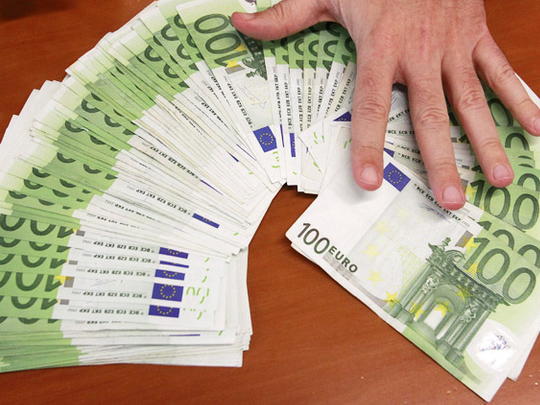
An extraordinary alliance of old-style French sovereignties, far-right populist, liberal economists and part of an Anglo-Saxon press is predicting the forthcoming death of the euro currency.
The financial crisis, that erupted in 2008 and turned into global economic chaos the year after, has put the onus on what in some countries has become the unbearable level of public debt and fiscal deficits.
In the European Union and in the aftermath of the Greek rescue, there has been mounting pressure against the European currency, its value versus other currencies and even more, its future itself.
"Euro is a money without a state. How can it survive?" Ten years, it seems, were necessary for some observers for discovering apparent evidence.
Actually, the euro was created in the late 1990s in order to bring back monetary stability in Europe and put an end to competitive devaluations from countries such as Spain or Italy.
The 11 countries (progressively extended to 16) who joined a common monetary zone committed to respect certain financial criteria, the so-called "Growth and Stability Pact", that would ultimately make these economies "converge" towards a more unified and stronger European entity.
Unfortunately, it did not happen. The absence of parallel political initiative may not have helped. Still, a clear enforcement of agreed rules pertaining to budgetary discipline could have saved the process. But it did not work.
An easy-going attitude and lack of budgetary solidarity finally led to the situations witnessed in Greece, Ireland and who knows tomorrow, in Portugal or in Spain. Thus, the question now is: Should the whole process be dismantled just because rules were not properly respected? I think not.
There are two main reasons for that. The first one is the absence of a credible alternative. Put aside the populist fantasy and sovereignties, there have always been some who never liked the euro and who think their time has now come.
They suggest to split it into two parts, a so-called strong "Euro-mark" (for good pupils) and a weak "Euro-franc" (for the rest of the class). Sure, they forget that the two-thirds of European trades take place between Euro-members themselves (immediate impact of euro's disappearance, ING bank reports, would be a 10 per cent growth recession over three years and unemployment rates of 14 per cent in countries such as France or Germany). More importantly, they can't answer two questions: What will happen to the euro-denominated debt? And what will happen to the banking system which is based on a euro? More generally, is a return to competitive devaluations a sought-after ingredient for stable growth in the euro zone?
Possible collapse
The second reason is euro itself and all the good it unanimously brought in the region. Be that as it may, the importance of euro means that its possible collapse would simply mean the collapse of the European economy and in the end, of the European Union itself. Much fortunately, there are countries in Europe such as France or Germany (whose cumulative GDP exceeds 50 per cent of the Euro zone GDP) who know what they would lose and who consequently, are not prepared to abandon it. They also know there is no other road to Europe but to strengthen itself if it wants to play any role on the international scene.
Fortunately, some recent decisions show the right way. Who would have thought 10 years ago that such a mechanism as the European Financial Stabilisation Fund, a bail-out plan of 440 billions euros (Dh2.15 trillion), could be set-up so quickly and allow for the rescue of Greece and Ireland? Some argued that Germany was slow to move. So what? Paying for those who did not respect the rules may allow for second thoughts. But in the end, the European Union did not let anyone fall apart.
In the wait for possible new tools (see the euro-denominated public bonds issue), all the 16 euro members now acknowledge the need for greater discipline, limitation of public debt and deficit, and better coordination and governance. Starting this year, each member state will have to submit its preliminary budget to the European Commission and to its peers. A European budget benchmarking will gradually lead to a budgetary solidarity. Germany and France have even started to work together to bring their fiscal policies closer.
One should thus better stick to the euro zone fundamentals: 322 million inhabitants, 75 per cent of the US GDP and 25 per cent of the world trade finance. One may see those selling euros to buy dollars (ever heard of the debt there?) or dollar-denominated gold.
Europe is today back on track to become more and more financially sovereign — a sovereignty based on the willingness and economic reality of the member states. Would that be the reason why Estonia seemed so happy to join the euro zone last January and become its 17th member?
Luc Debieuvre is a French essayist and a lecturer at IRIS (Institut de Relations Internationales et Stratégiques) and the "FACO" Law University of Paris.












